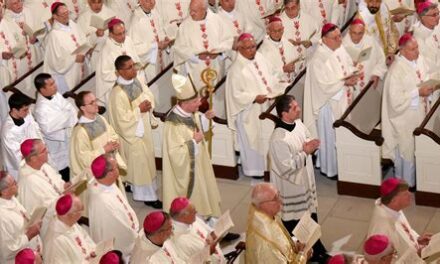Possibly the most memorable scene in The Dark Knight (2008), the second installment of Christopher Nolan’s Batman Trilogy, features a one-minute conversation between Bruce Wayne/Batman and his faithful butler Alfred Pennyworth. What Wayne cannot fathom is the reason for the infamous Joker’s wicked deeds. Alfred’s rejoinder is, as I have already indicated, hard to forget. After recounting a tale of his years in Burma in which a particular brigand robbed government caravans of precious jewels and then threw them away, Alfred, in his best Michael Caine imitation, denies any motive for the deed:
“Because some men aren’t looking for anything logical, like money. They can’t be bought, bullied, reasoned, or negotiated with. Some men just want to watch the world burn.”
Do such men really exist? In a strange and ironic way, the thought is appealing. There’s something in us that wants evil, when we become aware of its overwhelming presence, to be pure; and what could be more refined than evil without motive (except, of course, good without motive)? Thanks to St. Peter, we tend to imagine Satan as a “roaring lion, [who] walketh about, seeking whom he may devour” (1Peter 5:8), naturally for no reason except that he wants to. And when it comes to current politics, figures such as George Soros come to mind, men who seem to take a peculiar glee in wrecking economies (Britain’s, for example) and cornering resources that others desperately need, simply because they can. That’s another way of saying that we cannot detect in their actions the pursuit of anything good.
Recently, as I watched a video of “Antifa” protestors in Paris shattering the windows of a police car, setting it on fire with the patrolmen still inside, and then beating them with thin PVC rods as they exited, I thought of Alfred Pennyworth’s moment of insight and asked myself the question: Does “watching the world burn” explain the regular scenes—regular in frequency and manner—of maniacal brutality wherever Antifa rears its vicious head?
Traditional theology says no, chiefly in the person of Saint Augustine of Hippo who insisted that evil could not be a positive thing, that is, something that exists in its own right with its own inherent purposes, but instead was a perversion of the good or, as Augustine put it, a privation.
Over many years of teaching I’ve had occasion to use the saint’s definition to answer students who were perplexed about the presence of evil, usually in a work of literature but beyond that in the world outside the covers of any book. I do the same when I witness an especially grisly exhibition of cruelty or wanton violence, all too easy to see in this YouTube Age or read of the latest crime in the papers. Do such deeds conceal a good that has been twisted out of shape in an appalling manner? If a murder has taken place, was it an act of revenge? Then, as Bacon put it, a sort of “wild justice” has taken place—undesirable, to be sure, but akin to right. Was it a “crime of passion”? If so, might the denial of love or an affront to one’s dignity have been the cause? Self-love is not in itself an evil thing, however evil it may appear in the context of a crime. The evil, in such instances, is a matter of privation.
So it goes with many crimes. There really are Jean Valjeans in this world who rob because they’re starving, just as there are siblings so bullied by their own kin that they descend to murder as in Georges Simenon’s Pietr the Latvian. The deeds are ugly, but the sins are not matters of simple evil, or of just watching someone die or merely depriving someone of what he rightly owns.
Antifa, so-called due to its reputed anti-Fascist principles, provides an interesting case. If what one hears is correct, the large majority of its members (parts of a somewhat ill-defined body) are college students. They’re young people who have uncritically gorged themselves on the radical politics of their professors—men and women who in their younger days swallowed whole Herbert Marcuse’s doctrine of “repressive tolerance” with a relish that theologians once digested Aquinas and Augustine. Insofar as their enemies are “Conservatives,” a category defined so broadly that it includes anybody from White Supremacists to the editors of National Review, it’s easy to assume they have declared their right to silence the enemy for some greater good.
What is it? Some form of socialism? One or more of the fifty-seven varieties of “social justice”? A list of “rights,” some old and some newly minted? The content appears fluid. One thing that is palpable is the violence they are prepared to use, first in the stifling of free speech, second in the destruction of property, and third in the physical threats to anyone who stands in their way. Ask Charles Murray after Middlebury or Heather Mac Donald after Berkeley. Ask the Paris policemen whose actual politics must have been a mystery to Antifa but who had the bad luck to be deemed “Conservative” by virtue of their profession.
Does such behavior qualify as “watching the world burn”? According to strict Augustinian logic, it should not because of Antifa’s implicit politics, however nebulous. But as I watch them in action and hear rioters cry, “Death! Death!” (which even in French-speaking Paris I believe I caught on the video), I have at least to entertain the thought that no reform of society, no act of social contrition will satisfy their demands.
What Antifa wants has little to do with a vision of the good society; their oracles have declared the very idea of the “good society”—one of faith, freedom, virtue, and representative institutions—“racist.” Indeed, if a movement posits a world in which the things that truly constitute the good life itself are just so many masks for wickedness, how can the good inspire their actions? Put aside the logical objection that they must have some notion of good in order to define evil. Antifa has no time for logic, itself a “racist construct.” Their movement has resolved itself into a simple pleasure: “to watch the world burn.”
What Antifa wants has little to do with a vision of the good society; their oracles have declared the very idea of the “good society”—one of faith, freedom, virtue, and representative institutions—“racist.” Indeed, if a movement posits a world in which the things that truly constitute the good life itself are just so many masks for wickedness, how can the good inspire their actions? Put aside the logical objection that they must have some notion of good in order to define evil. Antifa has no time for logic, itself a “racist construct.” Their movement has resolved itself into a simple pleasure: “to watch the world burn.”














